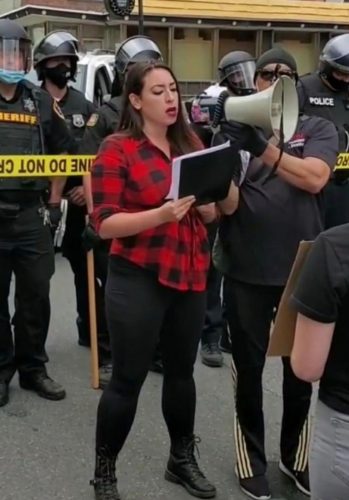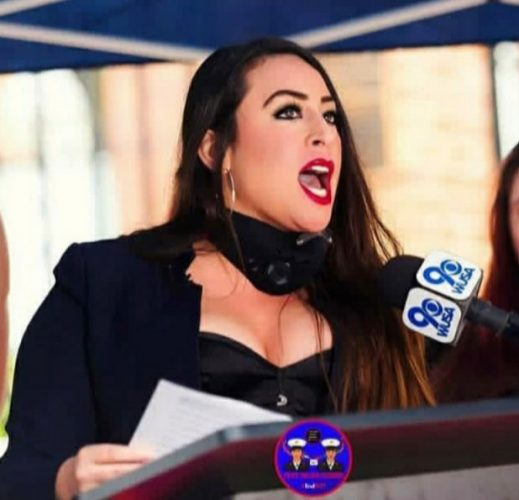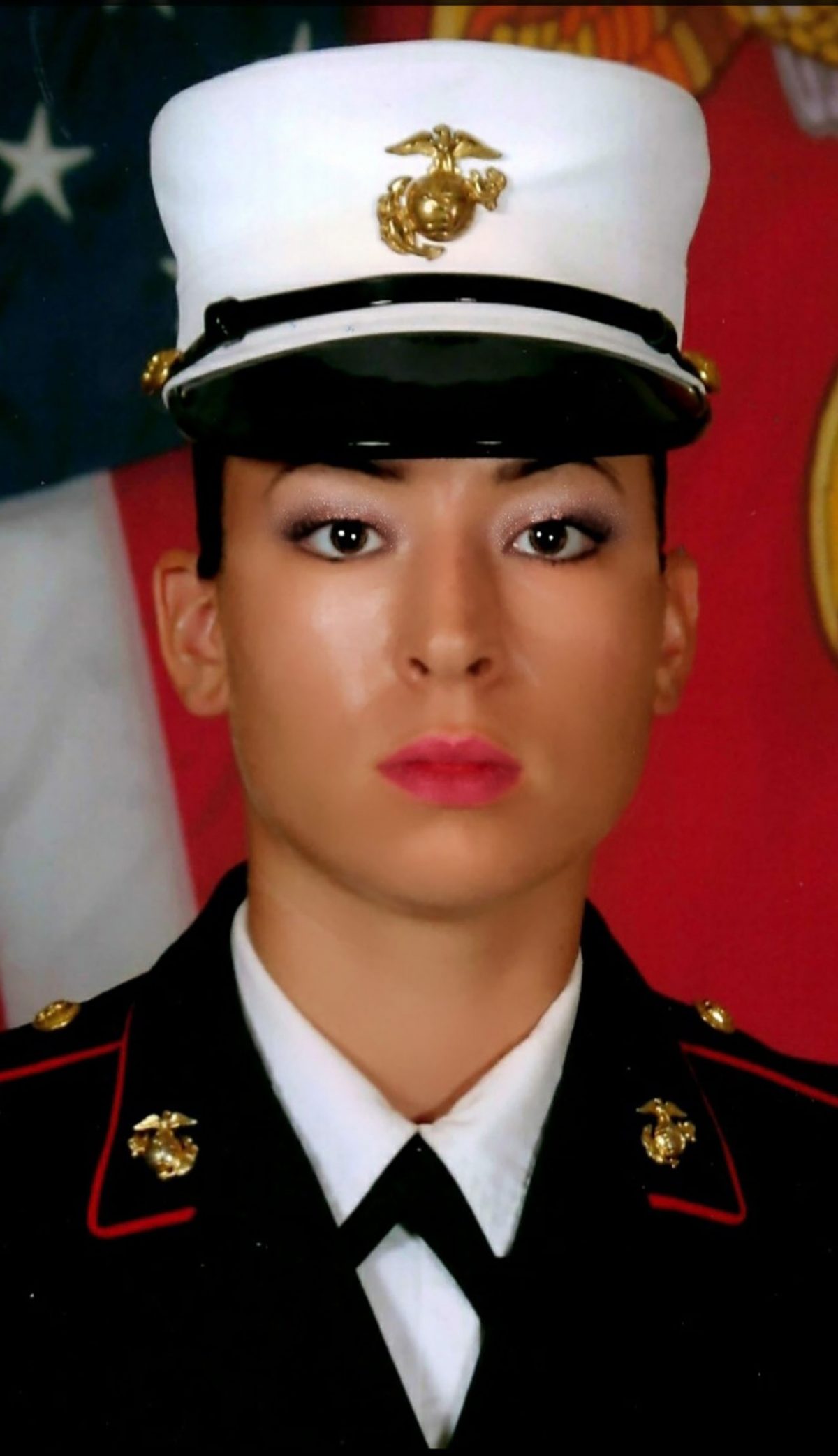Puerto Rican-American Janelle Mendez Viera is a survivor of military sexual violence and founder of the Military Sexual Trauma Movement. Having worked in the elite financial banking system on Wall Street in New York, she has also crafted legislation to benefit veterans who survived military sexual violence and gender discrimination, and today fights modern-day enslavement by launching financial technologies, in a new sector she calls financial defence, to hold the banking system accountable.
“While living in the Dominican Republic and writing the book, ‘The Pathway Towards Peace: US Human Rights Manifesto,’ I started to link almost every human rights abuse I was researching back to American banks. I was able to link modern Haitian enslavement to a sugar plantation in the Dominican Republic owned by a very powerful family in New York,” she told the Stabroek Weekend in an interview from New York.

The 34-year-old activist is the recipient of the 2022 Human Rights Award from the United States Institute of Diplomacy and Human Rights.
Having seen patterns of how the banks operate, how they reinforce and perpetuate human rights abuses, she said, “I think I know the technology that abolishes modern slavery. Because I worked on Wall Street and I know finance, I said, ‘let me see if I can develop a software that abolishes modern day slavery and holds the big banks to account’.”
She went to the government of the Dominican Republic to promote the technologies she had developed and she was advised to open her own bank, a challenge she has taken up.
Back in New York, she took her education benefit from the military and applied to Massachusetts Institute of Technology (MIT) to study advanced technologies and their applications within finance and defence. She started school as an executive student on January 20th on a one-year advanced certification programme.
“I will be applying for my bank licences and I’m also fund-raising capital to bring my inventions to market so I can start competing against the big banks. Basically, my technology is a system for real time fraud detection using artificial intelligence. I’m using these advanced technologies to fight oppression. By the time I come out and get my bank licences and my technologies developed I’m going to be launching a new sector of the economy called financial defence. My technologies will work for the financial market and for national security,” she said.
Mendez Viera is doing global outreach because she will launch a start-up that has the potential to become a global bank.
“My main objective is to compete as a global bank, abolish human rights abuses and slavery everywhere and create a fair economy for everyone. I’m reaching out to Latin America and the Caribbean because no one knows of me in these parts. In America I’m well known in the military, on Wall Street and in the feminist movement,” she said.
Beginnings
Mendez Viera was born and raised in New York to Puerto Rican parents. Her mother was a Puerto Rican American and her father claimed to be a Native American.
“In school, they told us our native group, the Taino, was extinct and we were just White. As I grew older and began to piece together my identity, I concluded I have a multicultural background of Spanish, Portuguese, African and Native American,” she said.
“I was doing research on Guyana because a part of my DNA originates from South America and I found that I come from the Lokono or Arawak people who live in Guyana. There are no Lokono or Indigenous Peoples settlements in Puerto Rico.”
According to her DNA she is 15 percent Arawak, other percentages of different tribes from Africa, about 25 percent Spanish and another 25 percent Portuguese. Her background and her experiences have changed her perceptions about America, its history and they have led her to her work in social and political activism and banking. Mendez Viera grew up in New York. Her parents were conservative Christians. When she was about 13, her parents divorced and her mother lost custody of her to her father. In high school she skipped the 11th grade, completed the 12th grade and graduated a year earlier than expected.
Abuse
She chose to join the Marine Corps because she was graduating under 18 years old and the military would pay for her college tuition. At the start of the recruitment process, she said, the recruiter told her that if she wanted higher education benefits he would help her to get them but she had to perform sexual acts with him.
“He coerced me,” she said. “Because I came from this ultra-religious Christian background, I didn’t know how to handle the dynamics of institutional sexual violence. If this is what I have to do to get the higher education benefits I wanted, I guess that’s what I had to do. That was how I went through a series of sexual violence including rape and torture in the military. It was really horrific…”

After graduating from boot camp and then attending the Military Occupational Specialty School in Portland, Missouri, Mendez Viera, at 17, had her first adult boyfriend who asked her continuously to send him a naked picture of herself. Eventually she did. She was exiting a class one day when a group of men showed her her naked photo on their phones. Smartphones were new and the picture was in black and white.
Her boyfriend said his phone was stolen and the person who stole it was selling the photo for five and ten dollars.
“From morning to late afternoon, the picture had gone out about 5,000 and 10,000 times to marines all over the US. When my boyfriend found the guy who stole his phone a fight broke out among the marines because someone had committed a crime,” she said.
When she tried to explain to her superiors that she was a victim of theft and child pornography, they told her she had signed up for the military and as such had lost her protection as a child. They told her she could not press charges. She was blamed for causing a riot in the Marine Corps.
Mendez Viera was charged with insubordination because she did not accept how the Marine Corps dealt with the issue. She was punished with restriction and her salary was suspended for two weeks.
“The perpetrator who was into sex-trafficking got away with it. I asked to see an attorney but they refused,” she said.
About a day or two before her restriction ended, a duty sergeant sent her to the male barracks to retrieve a doctor’s letter from a sick marine. Women are not allowed in the male barracks and she resisted, but the sergeant called another female marine who was also on restriction to accompany her. They went, but later discovered that the sergeant already had a copy of the letter.
“He had sent us to the barracks to haze us for the weekend. He told us if we did not comply with the hazing, we were gonna get written up. I was already written up for insubordination. Now, I was going to get administrative retaliation. I had no option but to get hazed,” she said.
In preparation for hazing, Mendez Viera and the other female marine were sent to their barracks with a female sergeant who told them to change out of their fatigues and put on dress uniforms. When she refused, she said, the female sergeant attempted to choke her but she punched her and knocked her out. Mendez Viera did boxing in middle and high school.
“I ran and locked myself in the bathroom. I was having a mental breakdown because so much trauma had just happened to me and it was progressively getting worse. I was 17 years old and I had no idea about the gender dynamics and gender biases I was dealing with,” she said.
About an hour later, she emerged after being offered legal and medical attention. That was a ruse.
After three days of hazing that included psychological torture and physical labour, denial of food and sleep, Mendes Viera said, the sergeant was relieved of his duties by another officer who documented what had happened. As part of the investigation into the incident, she was placed in an interrogation room and kept there for 15 hours with no food or liquid.
“They tried to convince me that I should not go to legal or to medical, that the abuse I was going through should stay in-house, and sex trafficking and retaliation against punishment was a normal part of marine culture. That was how I spent my 18th birthday. They told me they would not let me out until I said I didn’t want to do a medical or legal. I was text messaging this woman who went through this experience with me. She said we should agree or they would kill us. So we told them what they wanted to hear,” she said.
After they were released other female marines hid them in the trunk of a cab and they left the base. “We were on the run,” she said.
They spent the night at a hotel and the next day they went from Portland to St Louis in another cab. From there they took a Greyhound to Philadelphia, where they found that their bank accounts had been frozen.
“We had no money. We didn’t want to go back to that base. I went to a strip club with the female marine who had worked in one before. She said we could make enough money in one night to stay away from the marines for a month. You can stay away for a certain amount of days so as not to be sent back to a particular base. That is what I was trying to do. I wanted to stay in the marines but not at that base,” she said.
After stripping that night and earning enough cash, she returned to New York and called her mother who had not heard from her in about five years. “I told her I had to hide out and could not go back to the Marine Corps for 28 days. She didn’t understand but she knew I was terrified. She put me up at her friend’s house for 28 days after which I turned myself back in,” she related.
Drugged
Mendez Viera was sent to the Marine Corps Base in Quantico, Virginia. She was placed on fire watch because she was on restriction doing double duties for unauthorised absence. During her first week, she wanted to microwave some noodles in between duties and a ranked male marine directed her to the microwave oven in his room. There, a group of male marines offered her a drink. “I took it and I blacked out. I couldn’t remember anything that happened for the rest of the night. I later learned that the drink was spiked with five different pills,” she said.
The next morning, a rape test confirmed that she was raped the night before. Mendez Viera was jailed for under-age drinking. The gunnery sergeant who raped her was charged with adultery, jailed for 60 days and subsequently discharged. “I hired an attorney to fight the case. We won and I got out of jail,” she related.
Her attorney negotiated an agreement with the military to discharge her with medical and education benefits to begin her life anew, but when she tried to obtain the benefits she found she had been given a retaliatory discharge with no benefits.
“That cost me a 17-year battle with the government to get my benefits. I just got my education benefit and I got my health care benefit in 2021.” The education benefit is now funding her tuition at MIT.
When she was about 21, she started to have flashbacks from the violence she experienced in the Marine Corps. “I had nightmares. I couldn’t sleep. I couldn’t form relationships. I had all this neurological and psychological trauma and I was not getting proper treatment. I had substance abuse issues because I was trying to manage the symptoms my way,” she said
She went to the Veterans Affairs office which sent her for an evaluation. “That was how I learnt about Post Traumatic Stress Disorder. They put me in therapy which I did for a couple of years.”
Finance
After leaving the marines, she worked in finance and attended a community college simultaneously. From December 2008 to December 2019, she worked with the Bank of America, Citibank and JP Morgan.
In the middle of her career as an investment advisor, while doing research for post-graduate studies in banking finance, she found that a portfolio was funding the North Dakota Access Pipeline which was digging underneath a river on the Sioux tribe’s land which would affect the Sioux’s drinking water. “I brought it up with my managers and they dismissed me. This made me start questioning the banking system,” she said.
Outraged and as a victim and a survivor of human rights abuses, she was inspired to start a human rights movement but she was still working on Wall Street. She rounded up veterans on social media to agitate against the North Dakota Access Pipeline. “I said if they’re not going to listen to what I say, the least I can do is organise some veterans and get them to amplify the protest and help the voices of Indigenous Peoples. This was the first time I was organising a protest against the company I worked for and was doing this online to tell them we should not be funding and raising capital for this project,” she said.
In 2014, the Indigenous People’s protest became a national issue with thousands of people, including a large number of veterans, supporting it.
Feminism, MSTM
In 2018, at 28 years old she launched the Military Sexual Trauma Movement (MSTM).
“I started with PTSD and neurological damage. At 28, I miscarried and I found out it happened because of the trauma I had in the military. I told myself, I’m going to change the system. This is patriarchy and I’m not here to participate in that. I was told I had rights as a woman, that equal battles are fought and that we live in a democracy that is free and fair. It’s all a lie. I had never been so angry at any institution in my life the way I was at the Department of Defence. If I could challenge JP Morgan, I could challenge the world’s biggest military. I’m gonna make sure they give me my benefits back. I’m gonna make sure that this doesn’t happen to anyone else. I’m gonna make sure I destroy their ability to continue this system of patriarchy,” she said.
Before that, in 2015, she got involved in politics because she thought it would be a better route to enter the system. “That was my first time getting involved in political and social activism. When I realised I could organise people at the grassroots level, and I could challenge institutions, I realised I could challenge the military because I’m no longer a part of it,” she said.
She joined social media groups of female marines and started talking to them about the injustices with military sexual trauma. In one year, she had 25,000 veterans in the movement who had gone through similar experiences. The social media outlet movement was pushing the discourse.
“I decided I want to push it through real life,” she said and in 2018 she created, “a reporting tool where female marines could report sexual violence and sexual harassment to the movement directly.”
The MSTM would put cases together based on the Marine Corps policy and would make reports on behalf of the victims so they could stay anonymous. Then the MSTM started to pick up the cases that involved male marines in positions of authority and gave them to national newspapers which published them. “The Marine Corps pushed these men out,” she said.
Based on their success, Mendez Viera and volunteers of the MSTM were harassed and threatened by supporters of the Marine Corps.
The MSTM is aligned to the human rights movement.
“I realised that the people who were losing their benefits and getting retaliatory discharges predominantly come from minority groups, ethnic and racial groups and the sexual minorities. I realised the common theme was racism and discrimination. The only way to fix this system was to author legislation,” she said.
She began to read legal philosophy and inter sexual feminism and how to write laws that were difficult to repeal.
She authored the Restoration of Honour Act. It was passed by the New York House of Assembly and signed into law by then governor Andrew Cuomo on November 11, Veterans Day, in 2019. “That was my first political success,” she said.
Said to be the first intersectional military and veterans’ legislation in US history, the Act gives veterans who were discriminated or retaliated against a chance to get a discharge upgrade and reinstatement of benefits. Among her other legislative successes was an Independent Review Commission on Sexual Assault in the Military which was signed into law by President Joe Biden in 2021.










